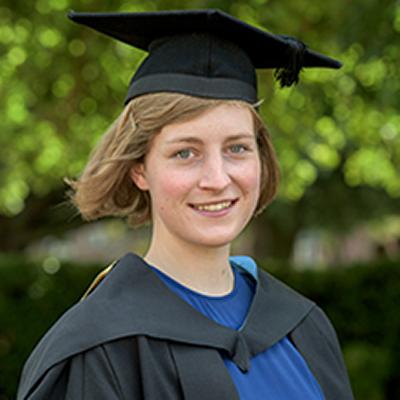Elizabeth Hogg BSc Biomedical Science, 2015
PhD in Medicine, Cancer Research UK, University of Manchester

My final year long-lab project was really valuable, being able to learn about academic research life, and feel like you are actually contributing to a lab groups’ work.
Why did you choose to come and study at Southampton?
I chose to study at Southampton because I found the content of the degree engaged me the most when looking around universities and the courses that they offered. I include in this the laboratory facilities, range of module options and teaching support available at the time. The environment of the campus itself was nice with lots of space and places to sit and eat or work.
What were your Southampton ‘highlights’ (best experiences)?
There are quite a few! I really enjoyed my course, but there’s more to university than just that. Joining student clubs and societies was a really good idea, getting me involved with the social scene and meeting people from different degrees and different backgrounds/experiences to me. Being completely independent was a new and exciting experience also!
What other activities did you take advantage of while at University?
The biggest thing I did was take a year out of my degree (between second and third year) to do a Year in Industry. I was based at GlaxoSmithKline in one of their labs, and this experience introduced me to the world of working full time as a lab-based scientist. I was also involved with the University Ladies Cricket Club, Ladies Tennis Club, and the Christian Union, all of which were great opportunities for meeting new people and taking my mind off my studies when needed!
What did you enjoy most about your course?
Probably learning new things - I really enjoyed most of my course. Being able to learn about a topic you are interested in is really motivating, particularly in second/third year when you get a lot busier but can choose to study more of the modules that interest you. The practical lab sessions in first/second year were completely new & different to anything I’d seen at school/sixth form; so although they could be challenging, it made a welcome change from just sitting and listening in lectures. My final year long-lab project was really valuable, being able to learn about academic research life, and feel like you are actually contributing to a lab groups’ work.
What have been the highlights of your career to date?
Firstly, my year in industry at GSK, which gave me some skills for office and lab work, and contacts for the future. My degree itself was a big achievement and I wouldn’t be where I am now without it. More recently: my studies towards a PhD for CRUK (based at the University of Manchester), which is an entirely new experience but great to delve into something new and to learn to become an independent research scientist.
How did your time at Southampton help you to grow as a person and help you get to where you are now?
My course gave me a good grounding in lots of different areas of biomedical science which opens up options when you want to choose what field to go into after your degree.
My year in industry gave me an understanding of the pharmaceutical industry, the confidence for lab-based research (and the realisation that I actually enjoyed this), networking, and office skills e.g. managing your time. Having responsibilities for your final year lab project/dissertation, as well as being a committee member of a club were useful experiences giving me more confidence, and people and planning skills.
What advice would you give to a student starting their degree at Southampton?
Find out what way you learn/revise best – I am quite a visual learner, so making colourful posters with the lecture information on helped me when it came to exam time. Try not to miss lectures – you’re paying for them, and it may mean missing a lot of new/complex information! Persevere when it gets difficult/stressful. Make use of asking lecturers questions, and do some practice papers before exams as this helps you realise what you do/don’t know.
Make the most of the clubs and societies available to you – there is a huge range and literally something for everyone. It’s really important to have something fun to get involved with outside of your degree to take your mind off its stresses and to enjoy other aspects of Uni life. The university/student-run cinema is a cheap alternative too!
What tips would you give to current students looking to start a career in your sector?
Think about what interests you and apply only for those jobs/studentships: it takes a lot of time and thought for good applications, and in final year you don’t necessarily have that time to spend! Don’t be discouraged by rejections – there will likely be lots of competition but if you have a keen interest, and ideally some lab-based work experience to write about, then that will help (you can use what you learnt from your dissertation lab project). Try to be proactive about finding work experience - ask lecturers, local companies, and think about doing a year in industry or the equivalent – as this will help you decide if you still want to do the job/further study you were first interested in.